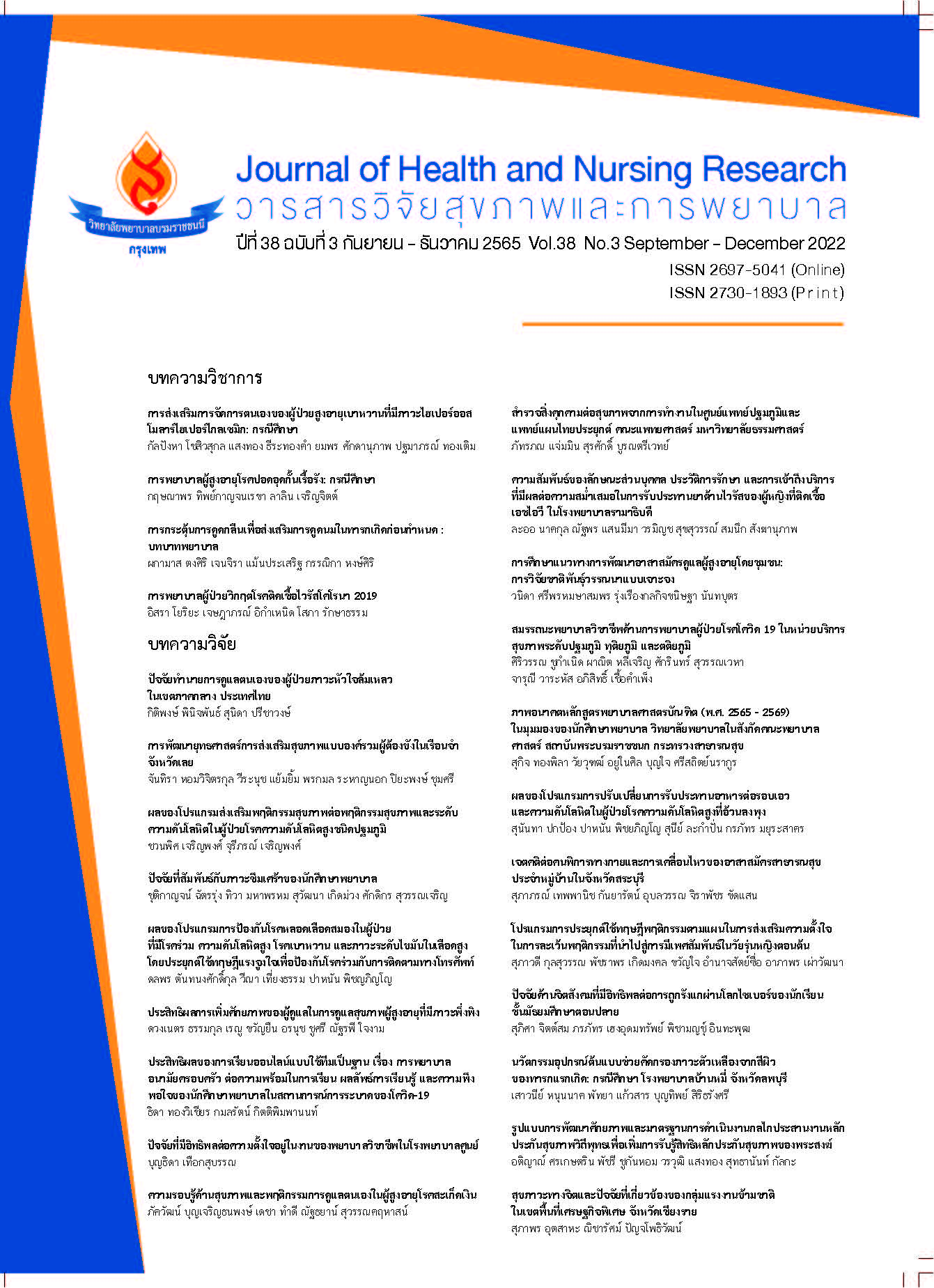ประสิทธิผลการเพิ่มศักยภาพของผู้ดูแลในการดูแลสุขภาพผู้สูงอายุที่มีภาวะพึ่งพิง
คำสำคัญ:
ผู้ดูแล , การจัดการดูแลสุขภาพ , ผู้สูงอายุที่มีภาวะพึ่งพิงบทคัดย่อ
บทนำ: การก้าวเข้าสู่สังคมผู้สูงอายุทำให้ผู้ดูแลผู้สูงอายุเกิดภาระส่งผลกระทบต่อการดำเนินชีวิต การอบรมจะช่วยเพิ่มศักยภาพในการจัดการดูแลสุขภาพผู้สูงอายุตามบริบททำให้การดูแลเกิดประสิทธิภาพที่ดีขึ้น และสร้างความเข้มแข็งของครอบครัวและชุมชน
วัตถุประสงค์การวิจัย: เพิ่มศักยภาพของผู้ดูแลในการจัดการดูแลสุขภาพผู้สูงอายุที่มีภาวะพึ่งพิง และพัฒนาหลักสูตรอบรมสำหรับผู้ดูแล
ระเบียบวิธีวิจัย: เป็นการวิจัยกึ่งทดลอง ในกลุ่มอาสาสมัครสาธารณสุขประจำหมู่บ้านและผู้ดูแลผู้สูงอายุ ต.บ้านลองตอง อ.สองพี่น้อง จ.สุพรรณบุรี เดือน ม.ค- ส.ค 2565 จำนวน 60 คน เครื่องมือ ได้แก่ หลักสูตรการอบรมผู้ดูแล แบบทดสอบความรู้ และแบบประเมินหลักสูตร ผ่านการตรวจสอบจากผู้เชี่ยวชาญ จำนวน 3 คน ค่าดัชนีความสอดคล้อง เท่ากับ 1.00, .67 -1.00 และ .67-1.00 ค่าความเที่ยงของแบบทดสอบความรู้ และแบบประเมินหลักสูตร ได้ .69 และ .98 วิเคราะห์ข้อมูลด้วยสถิติพรรณนาและ paired t-test
ผลการวิจัย: กลุ่มตัวอย่างเป็น อสม.ร้อยละ 89.30 เพศหญิง ร้อยละ 88.50 และผู้สูงอายุ (อายุ 60 – 69 ปี) ร้อยละ 44.20 ผลการเปรียบเทียบระดับความรู้กลุ่มตัวอย่าง พบว่า คะแนนเฉลี่ยความรู้ก่อนและหลังแตกต่างกันอย่างมีนัยสำคัญทางสถิติ (p<.05, t = 6.64) และผลประเมินหลักสูตรโดยรวม พบว่า อยู่ในระดับดี (M = 4.18, SD. = .72) การประเมินรายด้านของหลักสูตรฯ พบว่า ด้านบริบท ด้านปัจจัยเบื้องต้น ด้านกระบวนการ และด้านความเหมาะสม อยู่ในระดับดี (M = 4.06, 4.17, 4.19, และ 4.11, SD. = .63, .52, .57, และ .56 ตามลำดับ) ด้านผลผลิตอยู่ในระดับดีมาก (M = 4.20, SD.= .54) ดังนั้นการเพิ่มศักยภาพของผู้ดูแลผู้สูงอายุในการดูแลสุขภาพผู้สูงอายุที่มีภาวะพึ่งพิงด้วยหลักสูตรฯนี้สามารถนำไปใช้ได้
สรุปผล: การเพิ่มศักยภาพของผู้ดูแลผู้สูงอายุที่มีภาวะพึ่งพิงด้านความรู้จากการพัฒนาหลักสูตรอบรมฯ สามารถนำไปใช้ประโยชน์ได้
ข้อเสนอแนะ: บุคลากรทางการพยาบาลควรจัดอบรมเพิ่มศักยภาพของผู้ดูแลผู้สูงอายุด้วยหลักสูตรอบรมฯนี้ทุกปี
Downloads
เอกสารอ้างอิง
Department of Elderly Affairs. Statistics on the elderly in Thailand, 2016. [Internet]. 2017 [cited 2022 July 10]. Available from: https://www.dop.go.th/th/know/side/1/1/51 (in Thai)
Wankaew S. Image of hope for caring for the elderly with dependency in Thailand. LTC FORUM 2020, moving together towards sustainable long-term health services by the Health Manpower Research and Development Office (OSMEP) on November 17, 2020. (in Thai)
National Statistical Office. (2021). Executive summary survey of the elderly population in Thailand, 2021 [Internet]. 2021 [cited 2022 May 9]. Available from:http://www.nso.go.th/ sites/2014/Pages/.aspx. (in Thai)
Sirikampeng A, Phosing P. The long term care for the elderly dependency on Thailand country 4.0 Era. Dhammathas Academic Journal 2017;17(3):235-43. (in Thai)
Department of Health Service Support. Manual for officers to elevate the VHVs to become VHVs. Department of Health Service Support Ministry of Public Health; 2019. (in Thai)
Hsu CC, Wang YM, Huang CR, Sun FJ, Lin JP, Yip PK, et al. Sustained benefit of a psycho-educational training program for dementia caregivers in Taiwan. International Journal of Gerontology 2017;11:31-5.
Faronbib JO, Faronbi GO, Ayamolowo SJ, Olaogun AA. Caring for the seniors with chronic illness: The lived experience of caregivers of older adults. Archives of Gerontology and Geriatrics 2019;82:8–14.
Cabrera JL, Arques RM, Rioboo NA, Aran LR, Merino JR, Grau CF. Mobile applications for caregivers of individuals with chronic conditions and/or diseases: Quantitative content analysis. International Journal of Medical Informatics 2021;145:104310. (9 pages).
Velloze IG, Jester DJ, Jeste DV, Mausbach BT. Interventions to reduce loneliness in caregivers: An integrative review of the literature. Psychiatry Research 2022;311:114508.
Cohen L, Manion L, Morrison K. Research Method in Education. 8th Edition. New York: Routledge, 2018.
Office of Elderly Health. Handbook of training guidelines for elderly caregivers, 70-hour course. Department of Health, Ministry of Public Health. Bangkok: Mahachulalongkornrajavidyalaya Printing Press; 2015. (in Thai)
Working group to develop a long-term care manual. Long term care manual for family physician team. Office of Public Health Administration, Office of the Permanent Secretary, Ministry of Public Health. Bangkok: Cyberprint Company; 2016. (in Thai)
Borisut N. A study of the situation and direction of volunteer development in the Thai Era 4.0. Public Sector Health Development Group, Public Health Support Division, Department of Health Service Support; 2020. (in Thai)
Junpong M, Doungkorng W, Kulkiang P, Thanakhoung S, Bouban N, Nilpath E. The curriculum development of elderly school for further life quality of elderly by local wisdom. Journal of Graduate Studies Review Mahachulalongkornrajavidyalaya University, Phrae Campus 2017;3(1):87-102. (in Thai)
Nawawongsathean U, Keawkamsorn N. Curriculum development of the elderly school on health promotion for the elderly, social group in Sriwilai sub-district, Sriwilai district, BuengKan Province. Journal of Health Science and Community Public Health 2018;1(1):70-81. (in Thai)
Pitchalard K, Moonpanane K, Wimolphan P, Singkhorn O, Wongsuraprakit S. Implementation and evaluation of the peer-training program for village health volunteers to improve chronic disease management among older adults in rural Thailand. International Journal of Nursing Sciences 2022;9:328-33.
Gupta S. Impact of volunteering on cognitive decline of the elderly. The Journal of the Economics of Ageing 2018;12:46-60.
Yasmeen I, Krewulak KD, Grant C, Stelfox HT, Fiest KM. The effect of caregiver-mediated mobility interventions in hospitalized patients on patient, caregiver, and health system outcomes: A systematic review. Archives of Rehabilitation Research and Clinical Translation 2020;2:100053. (11 pages)
Zhang J, Wang Z, Li Y, Yu P, Cao X, Xu X, et al. Effects of a caregiver training program on oral hygiene of Alzheimer’s patients in institutional care. Journal of the American Medical Directors Association 2021;22(7):1429-34.
Baik D, Song J, Tark A, Coats H, Shive N, Jankowski C. Effects of physical activity programs on health outcomes of family caregivers of older adults with chronic diseases: A systematic review. Geriatric Nursing 2021;42(5):1056-69.
Pleasant M, Molinari V, Dobbs D, Meng H, Hyer K. Effectiveness of online dementia caregivers training programs: A systematic review. Geriatric Nursing 2020;41(6):921-35.
Velloze IG, Jester DJ, Jeste DV, Mausbach BT. Interventions to reduce loneliness in caregivers: An integrative review of the literature. Psychiatry Research 2022;311:114508.
Tunprapussorn K. The development curriculum promoting quality of life of aging: Case study of municipal city, Phitsanulok. Doctoral’s thesis in curriculum and instruction, Naresuan University; 2018. (in Thai)
Pattaphol M. Evaluation of curriculum for learning and development. 4th edition, Bangkok; Charansanitwong Printing Co., Ltd; 2018. (in Thai)
Na Lamphun S, Sukprapaporn T, Pulsawad W, Lebkhute H, Sukprapaporn B. Development of integrated learning curriculum by using community based for learners in Thailand 4.0 of demonstration school, Chiang Rai Rajabhat University. Lampang Rajabhat University Journal 2018;7(2):180-93. (in Thai)
Mavandadi S, Wray LO, DiFilippo S, Streim J, Oslin D. Evaluation of a telephone-delivered, community-based collaborative care management program for caregivers of older adults with dementia. The American Journal of Geriatric Psychiatry 2017;25(9):1019-28.
ดาวน์โหลด
เผยแพร่แล้ว
รูปแบบการอ้างอิง
ฉบับ
ประเภทบทความ
สัญญาอนุญาต
ลิขสิทธิ์ (c) 2022 วารสารวิจัยสุขภาพและการพยาบาล (วารสารวิทยาลัยพยาบาลบรมราชชนนี กรุงเทพ)

อนุญาตภายใต้เงื่อนไข Creative Commons Attribution-NonCommercial 4.0 International License.
บทความที่ได้รับการตีพิมพ์ เป็นลิขสิทธิ์ของวารสารวิจัยสุขภาพและการพยาบาล (วิทยาลัยพยาบาลบรมราชชนนี กรุงเทพ) ไม่สามารถนำไปตีพิมพ์ซ้ำในวารสารฉบับอื่น


















